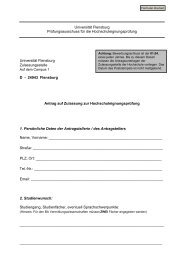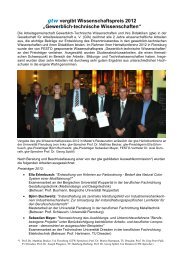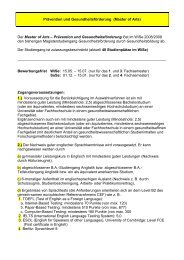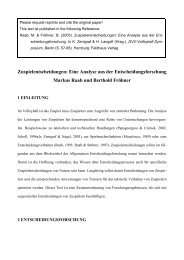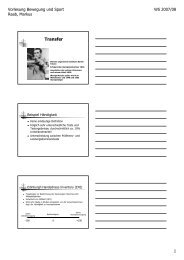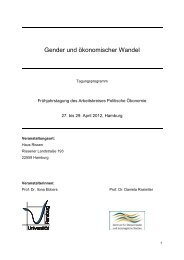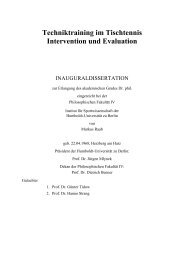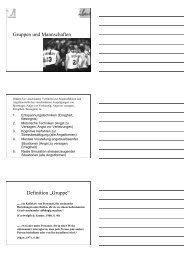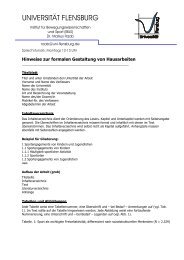Raab, M. & Magill, R.A. (2003). Motorisches Gedächtnis
Raab, M. & Magill, R.A. (2003). Motorisches Gedächtnis
Raab, M. & Magill, R.A. (2003). Motorisches Gedächtnis
Sie wollen auch ein ePaper? Erhöhen Sie die Reichweite Ihrer Titel.
YUMPU macht aus Druck-PDFs automatisch weboptimierte ePaper, die Google liebt.
12 C FUNKTIONSBEREICHE VON WAHRNEHMUNG, BEWEGUNG UND HANDLUNG<br />
Lee, T.D. & <strong>Magill</strong>, R.A. (1985). Can forgetting facilitate skill acquisition? In D. Goodman,<br />
R.B. Wilberg & I.M. Franks (Eds.), Differing perspectives in motor learning, memory and<br />
control (pp. 3-22). North Holland: Elsevier Science Publishers.<br />
<strong>Magill</strong>, R.A. (2001). Motor learning. Concepts and applications (6. Auflage). New York:<br />
McGraw-Hill.<br />
<strong>Magill</strong>, R.A. & Lee, T.D. (1987). Verbal labels effects on response accuracy and organization for<br />
learning limb positioning movements. Journal of Human Movement Studies, 13, 285-308.<br />
McPherson, S.L. & Thomas, J.R. (1989). Relation of knowledge and performance in boys’<br />
tennis: Age and expertise. Journal of Experimental Child Psychology, 48, 190-211.<br />
<strong>Raab</strong>, M. (2002). T-ECHO: Decision making under time pressure. Psychology of Sport and<br />
Exercise, 3, 151-171.<br />
Roy, E.A. & Davenport, W.G. (1972). Factors in motor short-term memory: The interference<br />
effect of interpolated activity. Journal of Experimental Psychology, 96, 134-137.<br />
Shadmehr, R. & Holcomb, H.H. (1999). Inhibitory control of competing motor memories.<br />
Experimental Brain Research, 126, 235-251.<br />
Schmidt, R.A. (1975). A schema theory of discrete motor skill learning theory. Psychological<br />
Review, 82, 225-260.<br />
Shea, J.B. & Wright, D.L. (1991). When forgetting benefits motor retention. Research Quarterly<br />
for Exercise and Sport, 62, 293-301.<br />
Starkes, J.L., Deakin, J.M., Lindley, S. & Crisp, F. (1987). Motor versus verbal recall of ballet<br />
sequences by young expert dancers. Journal of Sport Psychology, 9, 222-230.<br />
Stelmach, G.E. (1969). Prior positioning responses as a factor in short-term retention of a simple<br />
motor response. Journal of Experimental Psychology, 81, 523-526.<br />
Tulving, E. (1985). How many systems of memory are there? American Psychologist, 40, 385-<br />
395.<br />
van der Meer, E. (1996). Gesetzmäßigkeiten und Steuerungsmöglichkeiten des Wissenserwerbs.<br />
In F.E. Weinert (Hrsg.), Enzyklopädie der Psychologie. Bd. 2. Psychologie des Lernens und<br />
der Instruktion (S. 209-278). Göttingen, Hogrefe.<br />
Verwey, W.B. (1999). Evidence for a multistage model of practice in a sequential movement<br />
task. Journal of Experimental Psychology: Human Perception and Performance, 25, 1693-<br />
1708.<br />
Wilberg, R.B. & Salmela, J. (1973). Information load and response consistency in sequential<br />
short-term memory. Perceptual and Motor Skills, 37, 23-29.<br />
Willingham, D.B. & Goedert-Eschmann, K. (1999). The relation between implicit and explicit<br />
learning evidence for parallel development. Psychological Science, 10, 531-534.<br />
Wulf, G., McNevin, N., Shea, C.H. & Wright, D.L. (1999). Learning phenomena: Future<br />
challenges for the dynamical systems approach to understand the learning of complex motor<br />
skills. International Journal of Sport Psychology, 30, 531-557.



